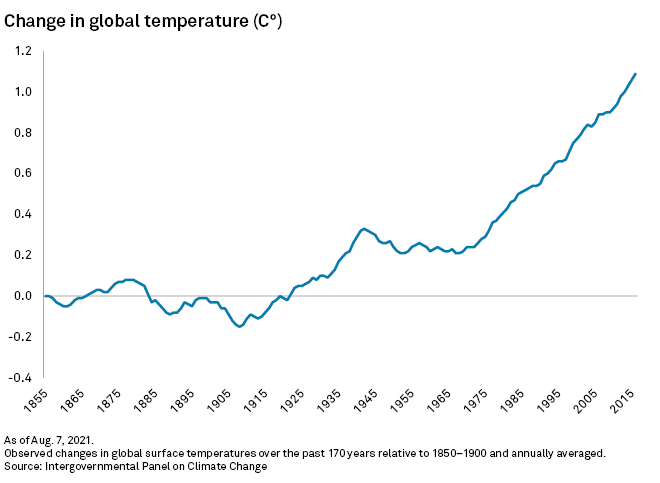Featured Topics
Featured Products
Events
S&P Global Offerings
Featured Topics
Featured Products
Events
S&P Global Offerings
Featured Topics
Featured Products
Events
S&P Global Offerings
Featured Topics
Featured Products
Events
Financial and Market intelligence
Fundamental & Alternative Datasets
Government & Defense
Professional Services
Banking & Capital Markets
Economy & Finance
Energy Transition & Sustainability
Technology & Innovation
Podcasts & Newsletters
Financial and Market intelligence
Fundamental & Alternative Datasets
Government & Defense
Professional Services
Banking & Capital Markets
Economy & Finance
Energy Transition & Sustainability
Technology & Innovation
Podcasts & Newsletters
9 Aug, 2021

By Bill Holland
Human-caused emissions have brought "unprecedented" and "irreversible" change to the atmosphere, but limiting or eliminating emissions of methane and other greenhouse gases from oil and gas operations could offer one of the best ways to slow the speed of climate change, a United Nations panel said in the latest edition of a climate report released Aug. 9.
In an update to a 2013 report, the Intergovernmental Panel on Climate Change predicted that — even with stringent reductions in greenhouse gas emissions — world temperatures will likely rise more than the 1.5-degree-Celsius goal set by the Paris Agreement on climate change within the next decade, 10 years earlier than previously predicted. Further temperature rise is also likely unless the world takes immediate action, the panel said.
"Stabilizing the climate will require strong, rapid and sustained reductions in greenhouse gas emissions and reaching net-zero CO2 emissions. Limiting other greenhouse gases and air pollutants, especially methane, could have benefits both for health and the climate," said Panmao Zhai, a co-chair of an IPCC working group for the study.
The study of existing climate research by an international panel of 234 scientists from 65 countries also strengthened the organization's conclusion that global temperatures are rising because of human activity, primarily the extraction and burning of fossil fuels. The panel called the human contribution unequivocal against a timeline of thousands of years.

Because methane has more than 80 times the warming potential of carbon dioxide, its impact on global warming is outsized. But because it dissipates in 20 years, reducing emissions would have a more immediate effect than limiting other carbon emissions that linger for a century or more, the scientists said.
"It is never too late to act," Environmental Defense Fund climate scientist Ilissa Ocko said after the report's release in Paris. "CO2 emissions will be critical to limiting the maximum extent of future warming, but cutting methane emissions is the single fastest, most effective way there is to slow the rate of warming right now."
Ocko said methane emissions, which drive roughly 25% of global warming, have been an afterthought in many climate policy discussions.
A White House official pledged that methane regulations mandating U.S. emissions cuts are in the process of being restored, and the Biden administration is working with international partners to bring about methane cuts abroad. "There's simply nothing that comes close for securing our near-term climate future, buying us crucial time to decarbonize energy and to develop advanced options like negative emissions technologies," said Rick Duke, President Joe Biden's senior director and White House liaison for the Special Presidential Envoy for Climate Change. "This new IPCC report is clear about the methane imperative."
Aniket Shah, the global head of environmental, social and governance and sustainability research at Jefferies Group LLC, said the report made clear that immediate reductions in carbon emissions will be required for the world to stay under a threshold of 2 degrees C. "This will likely mean that capital markets will reward companies that are making faster and more immediate CO2 reductions compared to those with far away targets," Shah said in an Aug. 9 note.
Two major oil and gas trade groups, the American Petroleum Institute and an organization representing smaller producers, the Independent Petroleum Association of America, pledged to cooperate with national and international efforts to limited methane emissions.
"Reducing methane emissions and addressing the risks of climate change are top priorities for our industry, and we've made significant progress as U.S. methane emission rates have declined nearly 70% in key producing regions over the past decade," API spokeswoman Bethany Aronhalt said. "We have more work to do, and our industry will continue to lead the way."